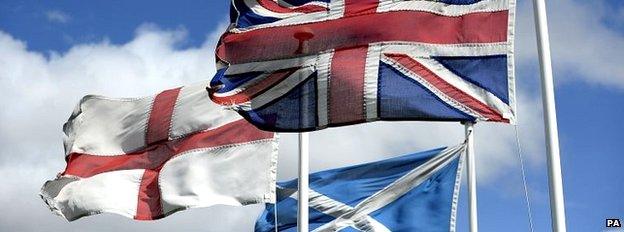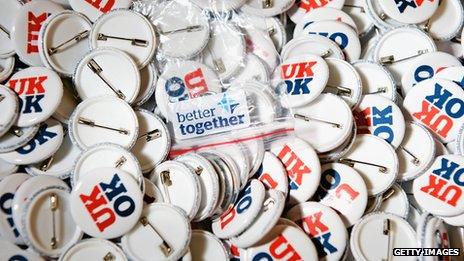Scotland - Vote No and get something better?
- Published

On the morning after the poll before, "Vote No and get something better" summed up George Osborne's message. It's a tried and trusted message which worked in the independence referendum in Quebec when a last minute poll lead for Yes was transformed into a narrow No. It is, though, a message with a difficult history in Scotland.
Thirty five years ago it was precisely what Scots were told when they were voting in a referendum on a much more modest proposal - to create a Scottish Parliament with some devolved powers.
A former prime minister, a Scot and, as it happens, a Tory, Sir Alec Douglas Home urged his countrymen to vote No and get "something better". The referendum rejected devolution and what they got soon afterwards was 18 years of Margaret Thatcher's government and no devolution at all (until, that is, Labour were re-elected in 1997).
That is just one reason why Osborne's promise of a plan to transfer new powers to Holyrood - covering tax raising, spending and benefits - caused such confusion yesterday. It is why Alex Salmond felt able to attack it as a sign of "panic" on the No side.
The other reason is that the three rival Westminster parties - the Conservatives, Labour and Liberal Democrats - have not agreed a plan for which precise powers to devolve. Each party has published its own set of proposals which overlap in the areas Osborne listed.
The plan he was talking about - but which is still being argued about behind the scenes - is to give Scottish voters certainty that this time - unlike last time - they are guaranteed to get "something better" whoever forms the next government in Westminster.
The Lib Dem Scottish secretary Alastair Carmichael has long talked about the idea of setting up a Scottish Constitutional Convention bringing together representatives of all parties - including the SNP - and none (trade unionists, business groups, the churches etc). This would hammer out a new settlement which all the Westminster parties would then promise to implement whoever is elected in the 2015 general election.
Who should announce this, where and how poses its own problems since Scottish voters - like voters right across the world - are deeply mistrustful of what politicians say. If all three party leaders stood together it would simply allow Alex Salmond to say "I told you they were all the same and that Labour were in bed with the Tories."
A striking finding of this weekend's YouGov poll is that the leader of the Labour Party - for so long the natural party of government in Scotland - is trusted by under a quarter of Scottish voters, the same number as it happens as trust David Cameron.
Alex Salmond is not immune from the anti politician mood, but 38% of people said they trusted him which may be one reason the Yes campaign is doing as well as it is.
- Published9 September 2014
